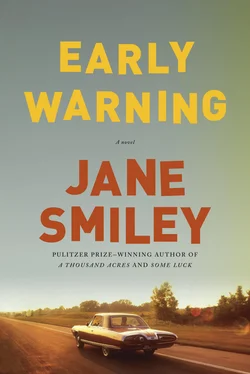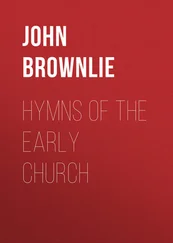Jane Smiley - Early Warning
Здесь есть возможность читать онлайн «Jane Smiley - Early Warning» весь текст электронной книги совершенно бесплатно (целиком полную версию без сокращений). В некоторых случаях можно слушать аудио, скачать через торрент в формате fb2 и присутствует краткое содержание. Год выпуска: 2015, Издательство: Knopf, Жанр: Современная проза, на английском языке. Описание произведения, (предисловие) а так же отзывы посетителей доступны на портале библиотеки ЛибКат.
- Название:Early Warning
- Автор:
- Издательство:Knopf
- Жанр:
- Год:2015
- ISBN:нет данных
- Рейтинг книги:5 / 5. Голосов: 1
-
Избранное:Добавить в избранное
- Отзывы:
-
Ваша оценка:
- 100
- 1
- 2
- 3
- 4
- 5
Early Warning: краткое содержание, описание и аннотация
Предлагаем к чтению аннотацию, описание, краткое содержание или предисловие (зависит от того, что написал сам автор книги «Early Warning»). Если вы не нашли необходимую информацию о книге — напишите в комментариях, мы постараемся отыскать её.
, a national best seller published to rave reviews from coast to coast.
Early Warning — читать онлайн бесплатно полную книгу (весь текст) целиком
Ниже представлен текст книги, разбитый по страницам. Система сохранения места последней прочитанной страницы, позволяет с удобством читать онлайн бесплатно книгу «Early Warning», без необходимости каждый раз заново искать на чём Вы остановились. Поставьте закладку, и сможете в любой момент перейти на страницу, на которой закончили чтение.
Интервал:
Закладка:
She watched him on the putting green with her father. She went to one little Wednesday horse show and wondered if having a horse would be possible in Iowa. Emily looked at the horses with fear and distaste, standing at a distance, holding Andy’s hand, but Janet got close, stroked equine noses with her fingertips, took in the mesmerizing scent, appreciated the snorts and head tossings, asked mildly intelligent questions of the owners. The closed-in piney warmth of the environment, the ease of the rocking chairs on the veranda, the casual beauty of the place were delightful, but then Jared said that they should buy property — you could buy a square-yard lot on the grounds and get privileges at the club. And they could live in the Research Triangle. Even compared with Iowa City, houses in Raleigh were…
“The Research Triangle is more than an hour from Pinehurst — it would be like working in Iowa City and living in Davenport.”
Jared blinked, informing her that her voice was sharp, then said, “Your dad says Raleigh is a great place to invest, a real center of education and on the East Coast….”
Janet had been hired just the previous fall as an adjunct assistant professor of technical writing. She taught three sections per week, twenty geeks in each section, many of whom did not speak English as a first language, even though they may have grown up in America and had American parents. They all spoke computer as a first language, and as a computer in-law, it was Janet’s job to show them how to reveal their thoughts and ideas to people whose last experience of math concerned the sides of a right triangle. She said, “I like my job.” She had to pretend that she understood almost nothing in order to motivate her students to be ever more clear and simple-minded. They thought she was a dope, but she brandished the weapon of grades. Her office mate in EPB, who taught beginning literature courses, had students who sat pensively outside the office door with their legs stuck out in front of them, waiting to discuss their revelations while reading On the Road and 1984. Janet had noticed at parties that when she said she taught technical writing, whoever she was talking to tended to start looking around the room. She said again, “I really like my job.”
Jared gave her a flat look, a look that informed her that she was sounding enraged or crazy.
That evening, sitting in the much-bewindowed dining room at the Pinehurst Resort, watching her father and Jared’s conversation drop from idle to intense, she understood that the self-protective little pod she had built — staying in Iowa City, avoiding family gatherings as much as possible, never taking money from or talking about her father, pretending Michael and Richie did not really exist — would crack apart. It would soon begin, flights in and out of Cedar Rapids, Jared alight with possibility, her father calling them. And what would she say—“I’ll get him,” or “I’m fine. Emily is good. I’ll get him”? That was the most she could imagine. Of course, Jared could install his own line, just for these calls. All these thoughts came to her within three or four minutes — long enough for her mother to walk with Emily over to the buffet and back. Emily sat in her chair, and Janet saw her father look at the child with interest, maybe for the first time ever, and why was that? Because she was related to Jared, and Jared had a lucrative idea. Janet stood up, said that she had a headache, and went back to her room.
Once there, she thought of phoning Debbie. She had phoned Debbie repeatedly since Aunt Lillian’s death. It was not that Debbie was especially sympathetic or even wise — Debbie was not quite three years older than she was, and about that much wiser. But Debbie had Aunt Lillian’s voice. It was a warm, good-natured, alto voice, and it pronounced certain words just as Aunt Lillian had. Debbie had let her know that she could not give Janet advice, much less let her go on and on long-distance. She was busy. She had a job and a family and grief of her own. Have I always been like this, Janet thought, so unself-consciously needy and talkative?
The answer was yes.
So she didn’t call Debbie.
Back in Iowa City, Jared didn’t speak to her for almost a week, but then his friend Oz suggested they move to San Jose. Jared brought this idea home as if it were a revelation. Janet did not panic, but said, “I’ve never been to San Jose.” She thought, no rain, no Lucas, no Reverend Jones, no Cat. And her dad three thousand miles away. She said, “I hear San Jose is quite sunny.” Jared threw his arms around her. She said, “Horses year-round in San Jose.”
Jared kissed her.
—
JESSE HAD GONE to the feed store in North Usherton to do some errands and stopped to buy Pampers. He didn’t have much cash — what farmer these days carried much cash? When he went to write out a check for the supplies, thirty-two bucks, Pete at the market said, “I can’t take that check, Joe,” and that was the first they heard about the Denby and Randolph Bank going under. For Jesse it was a shock and an inconvenience — Pete let him drive away, knowing someone would come in and pay the money — but for Joe himself it was something more. When Jesse found him and told him, Joe gazed into the hot, sunlit dust floating in the barn and felt paralyzed. They had a loan with Denby and Randolph, and they also had accounts there — Lois’s shop account, their joint checking account, the farm account, and a savings account. Joe jumped in the truck and drove to Denby, but he didn’t have to tell Lois: she was standing in the doorway of the shop, her lips a thin line, staring across the square at the bank, where a couple of guys were already taking down the bank sign. When she saw him, she said, “Good thing I sold that love seat yesterday, and an even better thing that I haven’t deposited this week’s receipts.”
He told her about Jesse’s exchange at the market.
“The kids got any cash?”
“I doubt it,” said Joe.
“Min always said there was a reason she did her banking in Usherton, but she could never remember what it was. Now we know. I guess she’ll take care of them for a few weeks.”
And so in spite of the suicides and foreclosures they kept hearing about, it wasn’t exactly like the thirties — there was the FDIC — but Joe had no idea how long it would take for their accounts to be repaid, or, indeed, whether there might be some snafu there, too. And the farm, well, in the thirties it had been worth fifteen or was it ten dollars an acre — Rosanna had told him that. Now it was worth maybe a thousand, a third of what Frank had paid Gary, and sliding. Would Walter have considered him a success or a failure? He was getting so many bushels per acre that the government was going to subsidize the farmers to take acreage out of cultivation, but no one in the Denby Café was going to take his best land out of cultivation — only the parts that had some slope or were swampy or ran along the river or were, frankly, exhausted. And that’s what Joe was going to do, too, and he expected to get 175 bushels an acre of corn and forty of beans and not to be able to pay his bills and to get a little check in a Christmas card from Frank to cover the shortfall. Dave Crest and Russ Pinckard and Rudy Jenkins always seemed to give him the eyeball, as if they knew he had a rich relative, and of course they did know it. It was an embarrassment to have a rich relative, and Joe knew perfectly well how specific knowledge of the shortfall got to Frank — Jesse’s correspondence with him was pretty regular. He probably told Frank all sorts of things he didn’t tell Joe or Lois. Wasn’t that always the way? Joe felt a stab of jealousy.
He pulled into the drive beside John’s old house, which he and Lois had moved into, leaving the big house to Jesse, Jenny, and Minnie. Jesse called it “the Maze”—it was more spacious than it looked, seven rooms. Back in the 1880s, the builder had marked out a forty-two-foot square, divided it into nine parts, designated the two parts across the right front as the parlor, and two parts along the east side in the back as the kitchen, and the other five parts, square rooms, you could do with as you pleased, so it did have a mazelike quality and Joe liked it. But there was none of the elegance of Roland Frederick’s kit house, with its oak paneling and sliding French doors and wide-planked floors. The Fredericks’ barn was just as rough and simple, but it was big and sturdy. Since they had pulled down Walter’s barn, the only trace of the place he’d grown up on was the Osage-orange hedge, which was thriving and, as always, a pain in the neck.
Читать дальшеИнтервал:
Закладка:
Похожие книги на «Early Warning»
Представляем Вашему вниманию похожие книги на «Early Warning» списком для выбора. Мы отобрали схожую по названию и смыслу литературу в надежде предоставить читателям больше вариантов отыскать новые, интересные, ещё непрочитанные произведения.
Обсуждение, отзывы о книге «Early Warning» и просто собственные мнения читателей. Оставьте ваши комментарии, напишите, что Вы думаете о произведении, его смысле или главных героях. Укажите что конкретно понравилось, а что нет, и почему Вы так считаете.











